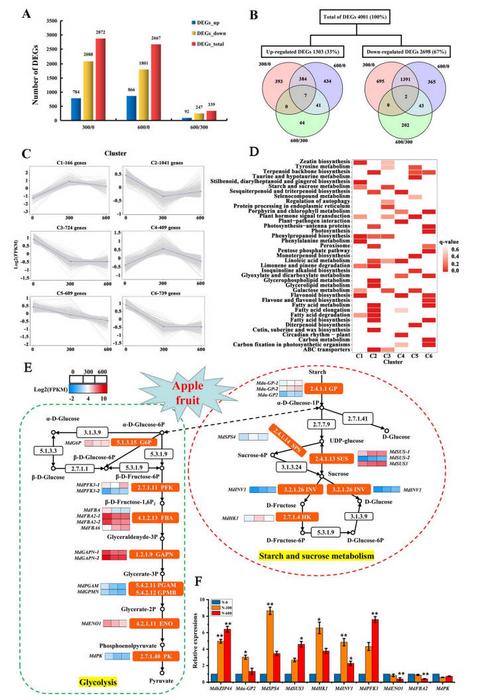Delving into the genetic underpinnings of fruit sweetness, researchers have discovered a novel regulatory mechanism in apples. The study spotlights MdbZIP44, a transcription factor that modulates starch and sugar metabolism in response to nitrogen levels, offering a genetic strategy to enhance fruit quality and potentially revolutionize the horticulture industry.
Apple quality and yield are significantly affected by nitrogen levels in the soil, which influence various biochemical processes. Insufficient nitrogen can result in poor fruit quality, while excessive nitrogen leads to environmental pollution. Understanding the intricate relationship between nitrogen and sugar metabolism in apple fruits is crucial. Based on these challenges, there is a need to conduct comprehensive research to elucidate the molecular mechanisms by which nitrogen impacts sugar metabolism, aiming to improve both fruit quality and sustainable agricultural practices.
Researchers from Gansu Agricultural University and Tianshui Normal University published a study (DOI: 10.1093/hr/uhae072) on March 15, 2024, in Horticulture Research, exploring the regulation of starch and sugar metabolism in apples by the MdbZIP44 transcription factor under different nitrogen levels. The study provides insights into the interactions between MdbZIP44 and other proteins that affect sugar metabolism.
The research found that MdbZIP44 expression is upregulated in apple fruits under nitrogen supply, resulting in increased starch accumulation and decreased glucose content. MdbZIP44 binds to the Mdα-GP2 gene promoter, inhibiting its expression and modulating starch and glucose levels. Additionally, MdbZIP44 interacts with MdCPRF2-like, forming a complex that activates Mdα-GP2 expression, crucial for sucrose metabolism. Overexpression of MdbZIP44 in both apple callus and tomato models led to higher starch and sucrose content, along with lower glucose levels. This highlights MdbZIP44’s role in enhancing sugar metabolism under nitrogen treatment. The study suggests that MdbZIP44 could be a target for genetic modification to improve apple quality, offering potential strategies for optimizing nitrogen use in apple cultivation and enhancing fruit quality and yield through genetic and agricultural approaches.
Dr. Juan Mao from Gansu Agricultural University stated, “Our findings reveal a complex regulatory network where MdbZIP44 not only influences starch and glucose levels but also interacts with other proteins to modulate gene expression critical for sugar metabolism. This research opens new avenues for improving apple quality through targeted genetic and agricultural practices.”
This study provides valuable insights into the genetic and molecular mechanisms underlying starch and sugar metabolism in apples, offering potential strategies for optimizing nitrogen use in apple cultivation. The findings could lead to the development of apple varieties with improved quality and yield, and more sustainable agricultural practices, reducing the environmental impact of nitrogen fertilizers.

Credit: Horticulture Research
Delving into the genetic underpinnings of fruit sweetness, researchers have discovered a novel regulatory mechanism in apples. The study spotlights MdbZIP44, a transcription factor that modulates starch and sugar metabolism in response to nitrogen levels, offering a genetic strategy to enhance fruit quality and potentially revolutionize the horticulture industry.
Apple quality and yield are significantly affected by nitrogen levels in the soil, which influence various biochemical processes. Insufficient nitrogen can result in poor fruit quality, while excessive nitrogen leads to environmental pollution. Understanding the intricate relationship between nitrogen and sugar metabolism in apple fruits is crucial. Based on these challenges, there is a need to conduct comprehensive research to elucidate the molecular mechanisms by which nitrogen impacts sugar metabolism, aiming to improve both fruit quality and sustainable agricultural practices.
Researchers from Gansu Agricultural University and Tianshui Normal University published a study (DOI: 10.1093/hr/uhae072) on March 15, 2024, in Horticulture Research, exploring the regulation of starch and sugar metabolism in apples by the MdbZIP44 transcription factor under different nitrogen levels. The study provides insights into the interactions between MdbZIP44 and other proteins that affect sugar metabolism.
The research found that MdbZIP44 expression is upregulated in apple fruits under nitrogen supply, resulting in increased starch accumulation and decreased glucose content. MdbZIP44 binds to the Mdα-GP2 gene promoter, inhibiting its expression and modulating starch and glucose levels. Additionally, MdbZIP44 interacts with MdCPRF2-like, forming a complex that activates Mdα-GP2 expression, crucial for sucrose metabolism. Overexpression of MdbZIP44 in both apple callus and tomato models led to higher starch and sucrose content, along with lower glucose levels. This highlights MdbZIP44’s role in enhancing sugar metabolism under nitrogen treatment. The study suggests that MdbZIP44 could be a target for genetic modification to improve apple quality, offering potential strategies for optimizing nitrogen use in apple cultivation and enhancing fruit quality and yield through genetic and agricultural approaches.
Dr. Juan Mao from Gansu Agricultural University stated, “Our findings reveal a complex regulatory network where MdbZIP44 not only influences starch and glucose levels but also interacts with other proteins to modulate gene expression critical for sugar metabolism. This research opens new avenues for improving apple quality through targeted genetic and agricultural practices.”
This study provides valuable insights into the genetic and molecular mechanisms underlying starch and sugar metabolism in apples, offering potential strategies for optimizing nitrogen use in apple cultivation. The findings could lead to the development of apple varieties with improved quality and yield, and more sustainable agricultural practices, reducing the environmental impact of nitrogen fertilizers.
###
Rerferences
DOI
Original Source URL
Funding information
This research was supported by the Science and Technology Major Project of Gansu Province (22ZD6NA045), Natural Science Foundation of China (31860530), and the ‘Double-First Class’ Key Scientific Research Project of Education Department in Gansu Province (GSSYLXM-02).
About Horticulture Research
Horticulture Research is an open access journal of Nanjing Agricultural University and ranked number one in the Horticulture category of the Journal Citation Reports ™ from Clarivate, 2022. The journal is committed to publishing original research articles, reviews, perspectives, comments, correspondence articles and letters to the editor related to all major horticultural plants and disciplines, including biotechnology, breeding, cellular and molecular biology, evolution, genetics, inter-species interactions, physiology, and the origination and domestication of crops.
Journal
Horticulture Research
Subject of Research
Not applicable
Article Title
MdbZIP44–MdCPRF2-like–Mdα-GP2 regulate starch and sugar metabolism in apple under nitrogen supply
Article Publication Date
15-Mar-2024
COI Statement
The authors declare that they have no competing interests.



